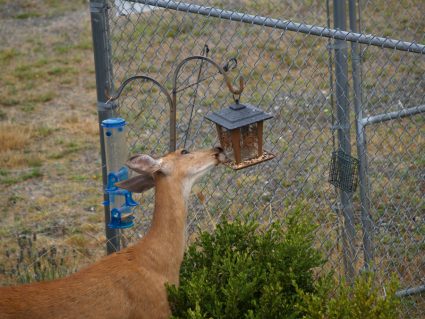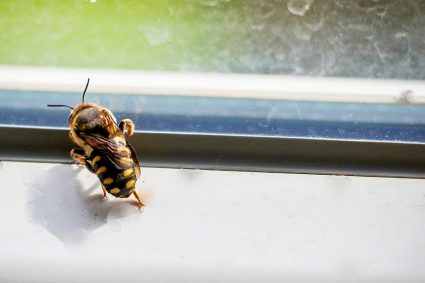
Gardens, with their lush greenery and abundant food sources, are often a magnet for wildlife, including ducks. While these waterfowls can add charm to your landscape and provide natural pest control, they can also cause damage to your plants, leave droppings around your property, and become a nuisance. In this comprehensive guide, we’ll explore effective and humane ways to deter ducks from your garden.
Deter ducks from your garden by installing a fence that’s at least 1.2 meters (4 feet) tall, using repellents such as commercial duck repellents or homemade ones like vinegar, employing scare tactics like predator decoys or motion-activated sprinklers, removing food sources like bird feeders or open compost piles, and using ultrasonic repellents. Regular maintenance, such as checking and repairing fencing, reapplying repellents, and keeping the garden tidy, can help keep your garden duck-free. Always use humane methods to deter ducks.
Reasons Ducks Are Attracted to Gardens
Understanding why ducks are attracted to your garden is the first step in developing an effective deterrent strategy. Ducks are drawn to gardens for several reasons:
- Food sources: Gardens provide a veritable buffet for ducks, who feast on slugs, snails, grubs, beetles, and other pests, as well as excess or second-grade garden produce.
- Shelter and protection: Bushes and shrubs provide ducks with shade from the sun, shelter from the wind, and a natural screen against predators.
- Water sources: Ducks are naturally drawn to water, so a pond or other water feature can be a strong draw.
- Natural environment: Gardens that mimic ducks’ natural habitats, with a mix of vegetation, water sources, and foraging opportunities, are particularly attractive to these birds.
Effective and Humane Strategies to Deter Ducks
It’s possible to deter ducks from your garden without causing them harm or stress. Here are some humane strategies you can implement:
Install Fencing
One of the most effective ways to deter ducks from your garden is to install a fence. Fencing options range from chicken wire or welded wire fence to more durable options like chainlink fencing. For the best results, the fence should be at least 1.2 meters (4 feet) tall to prevent ducks from flying over it.
Use Repellents
Repellents can be a useful tool in your duck-deterrent arsenal. Commercial duck repellents, such as Goose Stopper Repellent, contain all-natural ingredients that are safe for humans and wildlife. Alternatively, you can make your own repellents using ingredients like vinegar, which has a strong smell that ducks dislike.
Scare Tactics
Scare tactics can be surprisingly effective at deterring ducks. Predator decoys, like plastic owls or coyotes, can be placed around your garden to frighten ducks. Motion-activated sprinklers can also be used to startle ducks and discourage them from entering your garden.
Remove Food Sources
If ducks are finding plenty of food in your garden, they’ll keep coming back for more. Removing or securing food sources, such as bird feeders or open compost piles, can help make your garden less appealing to ducks.
Use Ultrasonic Repellents
Ultrasonic repellents emit high-frequency sounds that are unpleasant to ducks but inaudible to humans. These devices can be an effective, non-intrusive way to discourage ducks from visiting your garden.
Long-Term Maintenance of a Duck-Free Garden
Maintaining a duck-free garden requires ongoing effort. Here are some tips for long-term management:
- Regularly check and repair fencing to ensure there are no gaps or weak spots where ducks could enter.
- Reapply repellents regularly, especially after rain, to maintain their effectiveness.
- Monitor your garden regularly for signs of duck activity, such as feathers or droppings, and take action as needed.
- Keep your garden tidy and free of potential food sources to discourage ducks from foraging.
Remember, the goal is to deter ducks, not harm them. Always use humane methods and avoid tactics that could cause injury or distress to the ducks. With some effort and persistence, you can enjoy a beautiful, duck-free garden.
Frequently Asked Questions
Can I use a net to deter ducks from my garden?
Yes, you can use bird netting to protect your plants and deter ducks. However, ensure the netting is secured and checked regularly to prevent ducks or other animals from getting entangled.
Are there any plants that deter ducks?
There are no specific plants known to deter ducks. However, ducks are usually not interested in prickly plants, such as rose bushes, or highly aromatic plants like lavender and mint.
Is it legal to deter ducks from my garden?
Yes, it is legal to deter ducks from your garden as long as you use humane methods and do not harm the animals. Always check local wildlife laws to ensure your methods are compliant.
What do I do if the ducks keep coming back despite my deterrents?
If ducks keep returning to your garden despite your deterrents, it may be because they have identified it as a secure food source. In this case, you may need to reassess your strategies and possibly seek professional advice.
Can ducks harm my pets?
Ducks are generally non-aggressive animals and pose little threat to pets. However, they can defend themselves if they feel threatened, and their droppings can potentially carry diseases. It’s best to supervise interactions between ducks and your pets.











